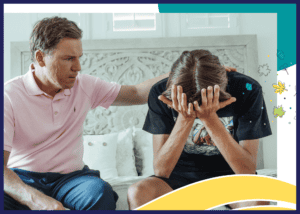Parenting is hard. Have you ever experienced a toddler meltdown?
Because you wouldn’t open a box of coffee k-cups, or because you gave the wrong coloured cup, or because you wouldn’t allow them to drive your car? (All in the last two days!)
It happens. And although we can at first laugh about it, because let’s be real, sometimes it’s ridiculous; it is also a very real emotional tsunami that can quite readily swallow up both of you.
I also know, from my work with children and youth, that these emotional tsunamis don’t stop for a long time. There are moments of calm, and there are moments of chaos.
If you have heard of mindfulness or Jon Kabat-Zinn, you may be familiar with the saying, “You can’t stop the waves, but you can learn to surf.” This is a life skill, and Distress Tolerance skill from DBT (dialectical behaviour therapy), which is a practice of riding the emotional wave. It may be something you are currently practicing for yourself. Big emotions come and go, and as adults, we can use our skills to weather the storm, or gracefully ride the emotional wave until we reach the shore.

Well, my toddler still runs funny, and while her motor skills are still developing, she has no ability to manage her emotions or even express in words how she is feeling. There are times to teach our children these skills, and times to model these skills. Parenting means there are also times when we have to share our surfboard with our kids, as we (perhaps not so) gracefully balance both of our bodies and energies. It is the safest way to shore.
They may fall off a few times, but if our board is steady, they will learn that they can reach out to us and we can help carry them through.
But if we are out of practice or unable to calmly ride those emotional waves ourselves, we can’t help our kids.
In order to teach them how to surf, we have to have the basics down, and we need to practice, practice, practice.
So thank you, little one, for reminding me that I need to stay true to my own practice, consistently.





